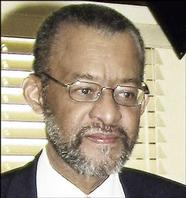Gareth Manning, Gleaner Writer 
Sobion
FOLLOWING WHAT has been described as an unprecedented move to subvert the rule of law by Trinidad and Tobago's Chief Justice, at least one legal expert confirms the same thing could happen here.
In an apparent attempt to delay impeachment proceedings against him, Chief Justice of Trinidad and Tobago, Satnarine Sharma, made an application for judicial review earlier this year, claiming Prime Minister Patrick Manning was acting on political and racial reasons when he attempted to have him impeached for perverting the course of justice. The Chief Magistrate, Sherman McNicolls accused Sharma of trying to influence his judgement in the trial of former Prime Minister, Basdeo Panday.
Last weekend Chief Justice Sharma also managed to subvert criminal charges laid against him for the same offence, after he successfully had an injunction brought against police and any authority with the power to arrest. He claimed the warrant for
his arrest was influenced by politicians.
The ruling means Sharma will be allowed to challenge any decision to institute criminal proceedings against him. Further applications restraining the police from arresting him will be in effect until the matter is heard in September.
The situation has sparked much debate in the twin island republic and in other parts of the region about the integrity of its judiciary, which is to be overseen by the accused Chief Justice.
The move to impeach him is not the first. Last year, a similar move was brought against Sharma for interfering in a case surrounding, surgeon, Dr. Vijay Narayansingh who was charged for murdering his wife. Then, the Chief Justice was accused of trying to influence the Director of Public Prosecutions to drop charges against Dr. Narayansingh.
JUDICIAL REVIEW APPLICATION
Like the present issue set against him, Sharma made an application for judicial review, claiming Mr. Manning's actions were driven by political and racial reasons.
Principal of the Norman Manley Law School, Keith Sobion says
the similarities between the constitutions of Jamaica and Trinidad and other English-speaking countries in the region could allow for actions like that taken by Sharma to be taken by officials in public office if attempts are made to impeach them.
"That can happen here in the same way, because if the Chief Justice or one is seeking to impeach a judge in Jamaica, he can say look this thing is being done because of bias on the part of the political executive, it is being done for political reasons or its being done for racial reasons. Says Sobion: "Any proper motive that he can ascribe to the prime minister or the persons who are supporting the allegation, then he can get the court to stay the proceedings against him and thereby delay the impeachment process."
Under section 99 of the Jamaica Constitution, a judge of the Supreme Court can be removed only if he is unable to discharge his functions because of mental or physical ailment or misbehaviour. Under the law, the prime minister then informs the Governor-General (in Trinidad's case the president) of the intention to remove the judge or investigate the issue.
TRIBUNAL
The Governor-General then appoints a tribunal on the advice of the prime minister made up of judges or former judges who have sat in a court of law with unlimited jurisdiction in some part of the Commonwealth or an appeals court that has jurisdiction over any such court. The Governor-General then recommends based on investiga-tions and recommendations by the tribunal whether the issue is to be referred to the local privy council for removal.
A similar process applies to persons who sit on Services Commissions established by the constitution as well as ministers of government.
Sobion says the current situation facing the Trinidad Judiciary impacts negatively on people's perception of the judicial system.
"It is a troubling situation because with all the fancy footwork there is a cloud hanging over the head of the judiciary and the public must consider if there are other holes [of this nature in the constitution]. And unless the judiciary can prove to them otherwise there will always be a cloud hanging over the judiciary," he says.
He says while it is no easy task, there may be a need for a review of the present constitution in regard to the impeachment process, so challenges to impeachments by judicial review can be more difficult.

